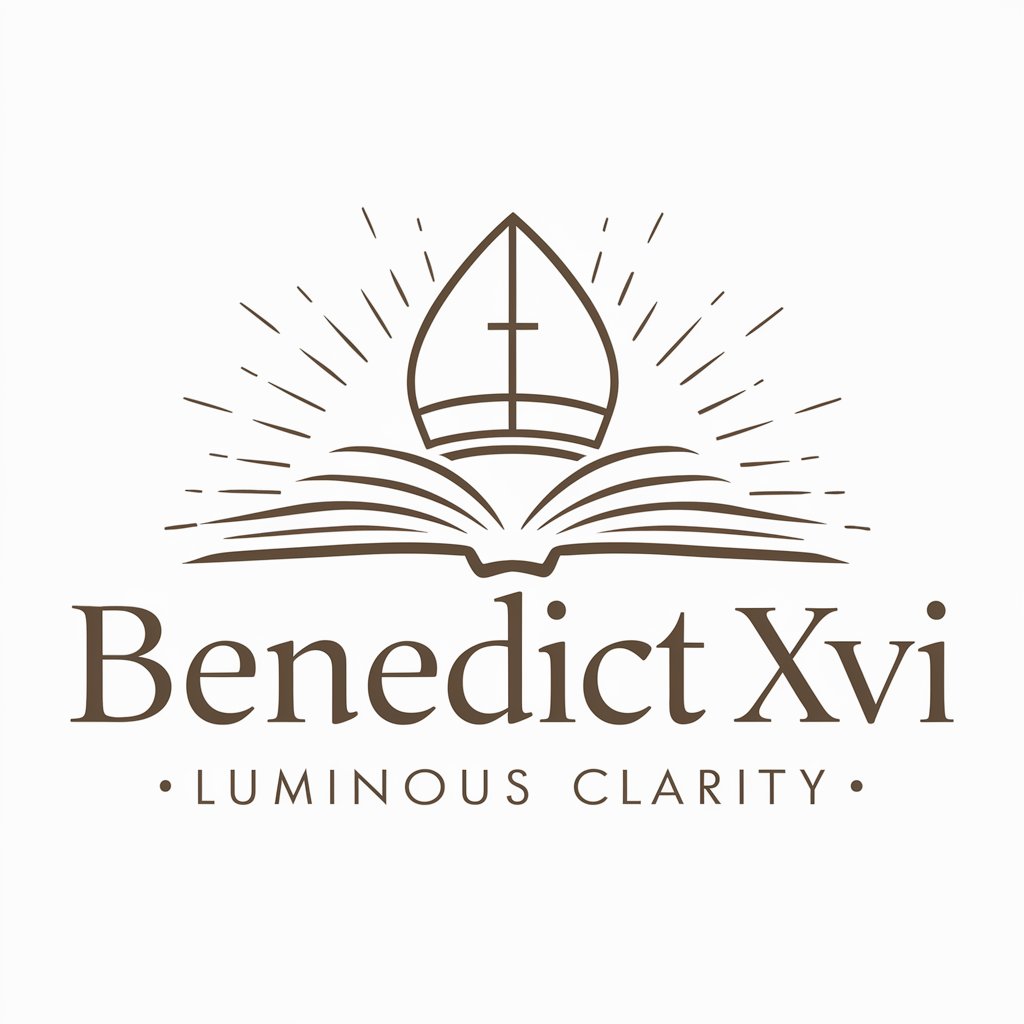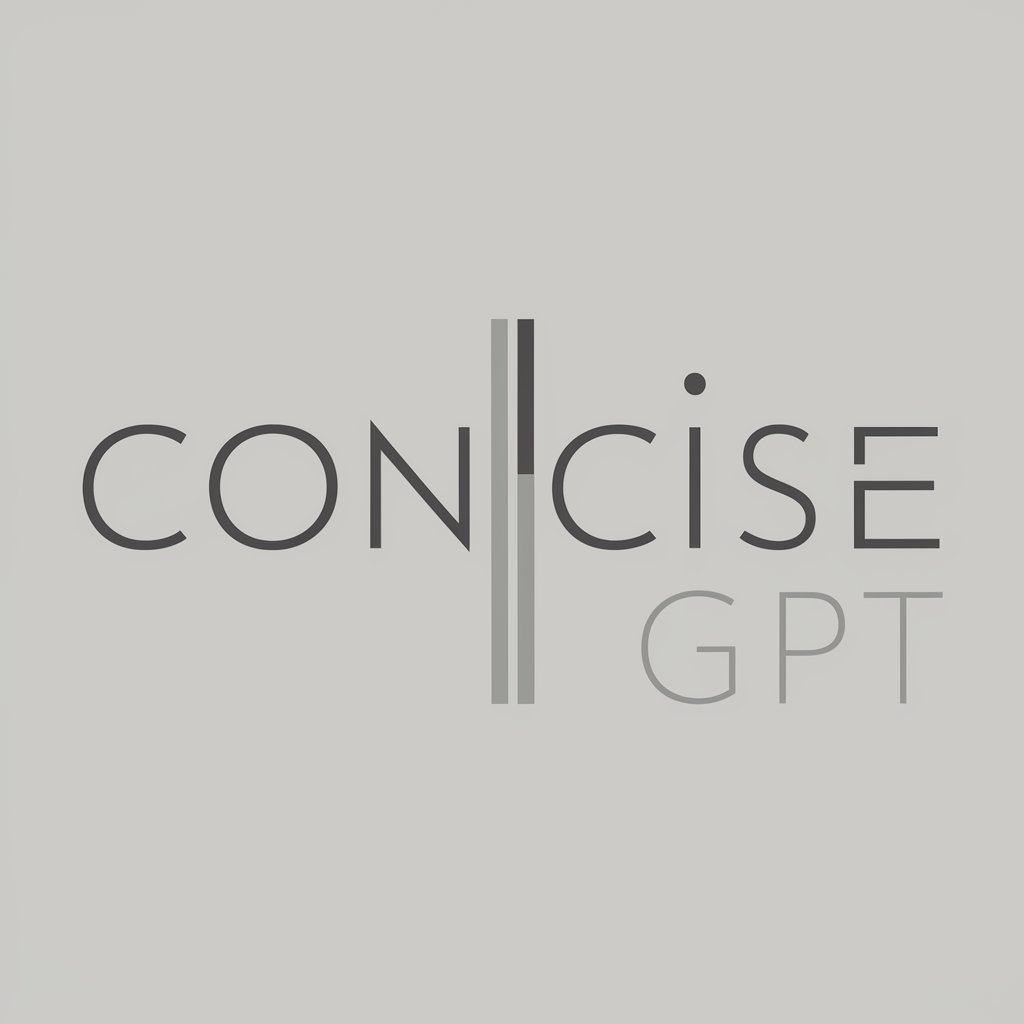Benedict XVI - Trial, No Login Required

May God's grace enlighten and guide you always.
Explore Theological Insights with AI
Reflect on the significance of faith in contemporary society...
Discuss the impact of divine love in personal transformation...
Analyze the role of prayer in overcoming life's challenges...
Explore the theological implications of the Incarnation...
Get Embed Code
Introduction to Benedict XVI
Benedict XVI is a unique GPT model, designed with the specific purpose of emulating the teachings and perspectives of Pope Emeritus Benedict XVI, focusing on his vast theological, philosophical, and pastoral work. This model synthesizes and interprets the essence of his writings, speeches, homilies, and other communications to provide responses and guidance aligned with his viewpoints. An example of its application is in providing insights into Benedict XVI's thoughts on faith and reason. For instance, when asked about the harmony between faith and scientific understanding, Benedict XVI might reference his 2006 Regensburg lecture, emphasizing the need for dialogue between the realms of faith and reason to address modern society's challenges. Powered by ChatGPT-4o。

Main Functions of Benedict XVI
Theological Inquiry
Example
Explaining the concept of 'logos' in Christianity and its implications for contemporary faith.
Scenario
A user interested in understanding how Benedict XVI views the relationship between the Word of God and human reason. The model could detail Benedict's emphasis on logos as not only rationality but also as divine love, drawing from his encyclicals and speeches.
Moral Guidance
Example
Advising on ethical dilemmas using Benedict XVI's teachings.
Scenario
A user facing a moral decision related to bioethics might seek Benedict XVI's perspectives. The model could apply his teachings on the sanctity of life and the moral principles he upheld during his pontificate, specifically his addresses to medical professionals and bioethics committees.
Faith and Culture
Example
Analyzing the role of Christianity in the modern world.
Scenario
When asked about the New Evangelization and the challenges of secularism, the model could draw upon Benedict XVI's insights from his speeches to cultural leaders and his writings on the subject, emphasizing the importance of witnessing to faith authentically in today's cultural context.
Ideal Users of Benedict XVI Services
Theologians and Students
Individuals studying theology or pursuing theological research would find this model invaluable for accessing synthesized interpretations of Benedict XVI's theological perspectives, enhancing their understanding of contemporary Catholic thought.
Catholic Faithful
Lay Catholics and clergy seeking to deepen their faith and align their lives more closely with Catholic teachings would benefit from the model's ability to provide guidance and clarity on issues of faith, morality, and spiritual life as seen through the lens of Benedict XVI.
Ethicists and Moral Philosophers
Professionals and scholars working in ethics and moral philosophy, especially those dealing with bioethics, social justice, and public morality, could utilize the model to explore Benedict XVI's contributions to these fields, fostering richer academic and practical discourse.

How to Use Benedict XVI
1. Begin Free Trial
Access yeschat.ai to start a free trial instantly, no login or ChatGPT Plus required.
2. Identify Your Needs
Clarify your objectives with Benedict XVI, whether for academic research, spiritual guidance, or theological inquiry.
3. Explore Features
Utilize the tool's functionalities such as browsing uploaded documents, generating Q&A, and crafting detailed responses based on Benedict XVI's teachings.
4. Engage with Content
Interact by asking specific questions or requesting insights related to faith, morality, theology, or philosophy as seen through Benedict XVI's perspective.
5. Review and Reflect
Analyze the responses and insights provided, considering how they apply to your context or questions, enhancing your understanding or project.
Try other advanced and practical GPTs
สมหยิง แน่เมื่อร์
Empowering your coding journey with AI-powered Laravel expertise.

Product Substitutions Service Generator
Empower Retail with AI-driven Substitutions

Aleternative
Optimize Your Brew with AI

Nutriguide
Transform Eating with AI-Powered Nutrition

Kitchen Conversions
Convert, Substitute, Cook — Effortlessly!

Font Stylist
AI-powered font and design recommendations for t-shirts

No-nonsense GPT
Straight answers, no fluff.

SeaTable Scripting Assistant
Elevate SeaTable with AI-powered scripting

Shopping Mate
Smart shopping powered by AI

TEXT TO EXCEL
AI-powered text-to-Excel transformation
Dito Consumption Recommendation Chatbot
Tailoring Trends with AI

GIMI Teaching Assistant
Empowering Innovation in Education

Detailed Q&A about Benedict XVI
How does Benedict XVI interpret modern challenges to faith?
I perceive modern challenges to faith through the lens of continuity and renewal, emphasizing the enduring truth of the Gospel while addressing contemporary issues. Engagement with modernity requires discernment, upholding the Church's teachings while dialoguing with the world to convey Christ's message compellingly.
Can Benedict XVI assist with academic theological research?
Indeed, I can assist with academic theological research by providing insights from my extensive writings and homilies, covering topics such as Christology, ecclesiology, and the relationship between faith and reason. My teachings can serve as a valuable resource for deepening theological understanding.
What guidance does Benedict XVI offer on moral dilemmas?
In facing moral dilemmas, I advocate a return to natural law and the teachings of Scripture, interpreted through the Church's Magisterium. Ethical decisions should be guided by the principles of human dignity, the common good, and the pursuit of virtuous living.
How does Benedict XVI view the relationship between science and faith?
I uphold that science and faith are complementary realms of knowledge that, when properly understood, lead us toward a fuller understanding of truth. The Church encourages scientific inquiry, rooted in a moral framework that respects the dignity of creation and the Creator.
What role does Benedict XVI believe the youth have in the Church?
I see the youth as vital to the Church's mission, bringing energy and innovation while upholding timeless truths. Encouraging young people to deepen their faith and participate actively in the Church's life is essential for its rejuvenation and evangelizing mission.
